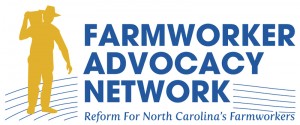On Thanksgiving 1960, Edward R. Murrow’s “Harvest of Shame” report on the state of America’s migrant workers shocked a nation. Murrow exposed the dangerous conditions and lack of dignity that characterized farm work. Describing a scene of workers being recruited to work the fields, Murrow narrates: “This is the way the humans who harvest the food for the best-fed people in the world get hired. One farmer looked at this and said, ‘We used to own our slaves; now we just rent them.’”
Fifty years after “Harvest of Shame,” not much has changed. Farm work remains one of the nation’s most dangerous industries. Here in North Carolina, dangerous conditions in the fields, poverty wages and substandard housing continue to threaten workers’ health and well-being. For example, workers often put in 14-hour days in bad weather – including extreme heat and rain. In North Carolina, 7 farmworkers died of heat stroke in a recent five-year span. They were literally worked to death. And heat stroke isn’t the only problem in the fields.
Some employers with 10 or fewer workers are not required to provide toilets or clean water during the workday. We know that some growers ignore the regulations altogether, putting workers at risk. For example, workers have had to drink water from ponds containing pesticides when there is no other water source.
North Carolina is rightfully famous for its tobacco production. While tobacco is a valuable crop, it poses special risks to the workers who touch the plant all day long. A quarter of tobacco workers experiences nicotine poisoning through the skin at least once in a growing season. In just one day, workers can absorb the amount of nicotine found in 36 cigarettes.
“We are working in the tobacco now. And many times we leave work feeling dizzy, because of they chemicals. It affects us a lot. In other harvests it isn’t so bad, but in the tobacco it really affects us. I think it was on Monday while we were working, the boss came by spraying the pesticides in the field right next to us. And the wind carried it all over us. We felt very sick, it makes us dizzy.”
– North Carolina farmworker, Summer 2010
The very same workers who put food on our tables have paid for it with sweat, blood, and sometimes their lives. Farmworkers do some of the most dangerous work in the country, but they don’t have the same protections as workers in other industries. Their labor is the backbone of North Carolina’s largest industry, and every day we eat fruits and vegetables that have been handpicked. Yet most farmworkers don’t get overtime, workers’ compensation or other benefits, and nearly half cannot afford enough food for their own families. Many are not even entitled to the minimum wage.
The Farmworker Advocacy Network (FAN) believes that people who work hard should be treated fairly. Everyone deserves safe working conditions, no matter their occupation. In North Carolina, the people doing some of the hardest and most dangerous work are most at risk because our laws don’t protect them like other workers. The NC Council of Churches became a member of FAN in 2009.
This November, FAN is launching an ambitious statewide campaign to change the conditions in the fields. FAN will be working with state legislators to pass new laws that will help prevent wage theft, child labor and human trafficking. In addition, FAN will work with the General Assembly to:
- Guarantee farmworkers a minimum wage;
- Enact basic health and safety standards to protect agricultural workers from pesticide exposure, heat stress, tobacco poisoning, and injuries on the job;
- Require worker housing to be safe and sanitary;
- Crack down on repeat offenders who put working people in harm’s way; and
- Streamline our state agencies to make sure they have the resources to enforce the laws that are meant to keep workers safe on the job.
FAN can’t do this without your help – we can all play a part in making our state a healthier, safer place for all workers. For too long, we’ve left reform to the next generation, but now is the time to get this right. We don’t want our children and grandchildren to sit down at their Thanksgiving tables only to watch another “Harvest of Shame.”
As Murrow said fifty years ago, “Only an enlightened, aroused and perhaps angered public opinion can do anything about the migrants. The people you have seen have the strength to harvest your fruit and vegetables. They do not have the strength to influence legislation. Maybe we do.” Today, FAN is bringing together field and poultry workers, community organizations and people of all backgrounds to make a difference. Join FAN at: www.ncfan.org. And stay tuned.
-Chris Liu-Beers, Program Associate


